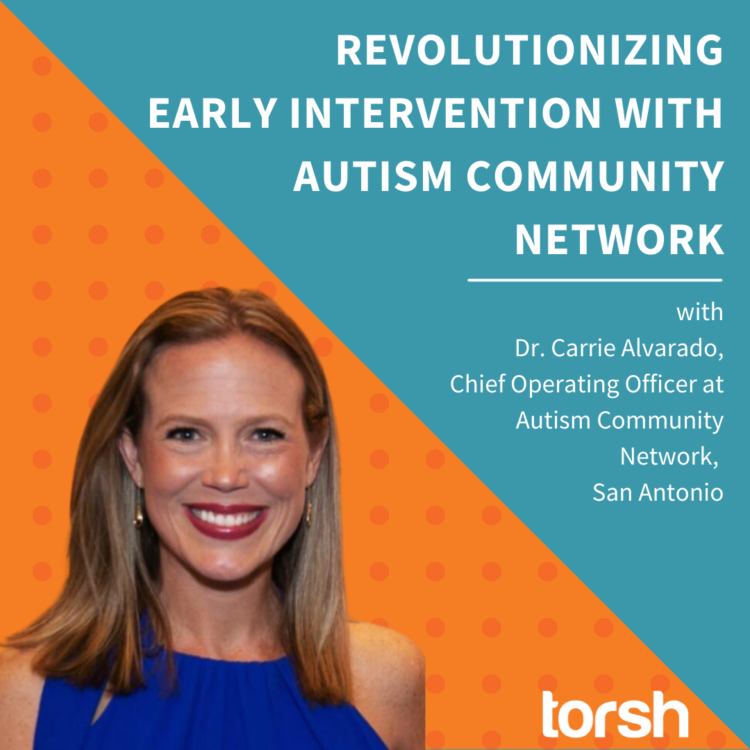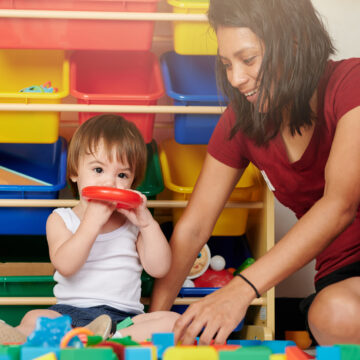“TORSH has so much capacity to be helpful in both research and clinical work, because film as a modality of intervention is just so powerful… This platform is really supporting innovative changes in autism research and intervention.”
Dr. Carrie Alvarado, COO for Autism Community Network
Dr. Carrie Alvarado serves as the Chief Operating Officer for Autism Community Network, San Antonio (ACN). We sat down with her to discuss the ways in which leveraging TORSH for telediagnostics and teletherapy has transformed her practice, as well as allowed ACN to provide critical access to life-changing intervention and support services for families who would otherwise experience financial barriers to equitable assistance.
Autism Community Network (ACN) is a nonprofit that was established in 2008 by a consortium of health care funders concerned about the lack of development services available to vulnerable children suspected of having autism spectrum disorder (ASD). ACN addresses the diagnostic, therapeutic, interventional, and recreational needs for families affected by ASD living in San Antonio, TX, and surrounding counties. Their mission is to maximize the potential of children with autism by providing early diagnosis for those with limited access and educating and empowering the community to support them. Though ACN works with families in many different socio-economic levels, the organization primarily helps those being served by Medicaid.
“Our agency is so excited to be engaged in this kind of innovative work with families. In the traditional world of autism intervention, you’ve got your clinical outpatient therapies, you’ve got home health therapies, but this is very different. We still develop goals for the child, we still want specific outcomes, we want coregulation and reciprocal joy between caregivers and their children. But we’re capturing more than social communication improvements in the child — we’re seeing global improvements. We’re working with and helping the whole child, and really the whole family system, access a higher quality of life and relationship,” Carrie asserted.
Revolutionizing Early Autism Intervention
“Our agency provides families with the most innovative, up-to-date, evidence-based interventions available, and then they can go out into the larger world with confidence and advocate for their child until their child can advocate more fully for themselves.”
Dr. Carrie Alvarado, COO for Autism Community Network
Carrie is the creator and director of the Earliest Connections Clinic, ACN’s diagnostic program geared toward early identification and therapeutic intervention for high-risk infants and toddlers. Additionally, she leads ACN’s intensive therapy/teletherapy intervention programs supporting families impacted by autism through dyadic coaching using both in-vivo and reflective video feedback modalities.
“As I’ve been in practice, my work has increasingly moved towards a parent coaching model while my role as a clinician has become increasingly facilitative in nature,” Carrie said. “The pandemic shifted our agency, just as many others, into full tele-practice overnight. Finding the TORSH Talent platform and combining it with a power-packed intervention model like Pediatric Autism & Communication Therapy (PACT) was a winning combination that was timed just perfectly. It had a synergizing effect for our clinicians and our families, which added a wonderful sense of stability and productivity as we ventured into new terrain together.”
Autism Community Network’s infant and toddler diagnostic program is making a significant difference in the lives of young children who have or are suspected of having autism and their families. Children 30 months and younger who are referred to ACN no longer have to wait until they receive an official diagnosis in order to begin intervention. Furthermore, the time these children spend on a waitlist is roughly one-fifth as long as wait times were before the establishment of the clinic.
Overall, this clinic ensures that these children and families are receiving the help that they need much sooner than they would be able to access it elsewhere.
This early intervention “sets the whole family on such a healthier trajectory moving forward,” Carrie explained. “Families can now access help as soon as they have concerns. Our skilled clinicians can team up with them and help alleviate some anxiety, help them better understand their child’s developmental differences, and help them understand the essential role that THEY can play in their child having a happier and healthier life.”
The children and their parents build a foundation for continued intervention and what best practice intervention should look and feel like. Because caregivers take a lead role from the very beginning, they can more aptly help their children generalize their social communication capacities to other important people in their lives. When caregivers can capitalize on every opportunity to promote their child’s sense of relational safety and communicative effort, this helps the kids develop a greater sense of agency. Over time, this builds capacities in the child that are sustained. The caregiver(s) begin to feel less scared or anxious about their child’s diagnosis and future.
“Plus, families leave our programs knowing a lot more about autism, which itself is empowering,” Carrie said. “We help families unpack their preconceived notions about what autism means. We help them celebrate the strengths that their child brings to the table. We help them learn to ‘see’ their child and their relationship through new eyes. I wish this was a situation that every family could encounter at their child’s diagnosis.”
Putting Parents in the Driver’s Seat
“Putting the parent in the driver’s seat is crucial if we want to have a skill sustained and generalized.”
Dr. Carrie Alvarado, COO for Autism Community Network
“Okay, so TORSH Talent is perfect for my work,” Carrie explained. “What PACT has allowed me to do, and what TORSH has supported PACT in doing, is really put the parent at the forefront.”
PACT is a parent-mediated, strengths-based, relationally-focused approach that uses reflective video feedback. The parents lead the therapy sessions and set goals for themselves as they and their child progress.
For sessions, parents videotape themselves playing with their child for 10 minutes “in their own home, with Brother there, with Dad there, with the dog there, with their own toys.” Carrie then works with the parents to review the video footage. “We can see right into what that relationship looks like and how that communication style is working or not working. And we really shine the light on those moments of success.”
The idea, Carrie said, is basically like teaching someone to ride a bike. “The parent is on the bike, I’m holding onto the back, and little by little they learn to balance themselves and become confident in the direction they’re heading. I fade my hands off of the back of the bike, and there they go into the sunset with their child.”
Throughout our conversation, Carrie emphasized that incorporating film into teletherapy can be revolutionary for families — and parents of children with autism in particular — as they adjust to life with a diagnosis.
“It really helps them learn to change their perspective and to internalize and reflect on beautiful moments of connection that we want to build more of, because now they can see themselves in action being successful,” Carrie explained. “It really starts to be a game changer for the way they perceive themselves as parents. They start to see themselves as capable, which is a dramatic change for so many of our parents who arrive having gone through really emotionally difficult terrain.”
Empowering parents and families to use the most optimal strategies in promoting their child’s development in all areas of life — at home, in the grocery store, in the backyard, at Grandma’s house — is beneficial to both parents and child. Carrie emphasized that “putting the parent in the driver’s seat is crucial if we want to have a skill sustained and generalized over time.”
After a year and a half of working with families virtually, Carrie explained that she does not think that she will return to a model of coaching with parents en vivo. “I have seen too much efficacy and growth in the parents in telepractice. I’ve seen the amazing changes that PACT and Floortime, another fantastic relational-developmental model we use, have done for the kids. You know, before, I thought I was doing the parents a service by modeling behavior, and jumping in, and asking questions in the moment, and I am sure I was to some degree. Now, though, I think that may have been distracting… Those magic moments of connection belong to them. I want them to feel that THEY were the gamechangers, and I want them to feel as competent as possible moving forward.”
Using TORSH Talent as a Comprehensive Home Base
“Being able to go in with Talent and meticulously rewind, and tag, and analyze video with a parent is invaluable.”
Dr. Carrie Alvarado, COO for Autism Community Network
“I’m really grateful to have TORSH Talent as a home space for our ACN families, clinicians, and trainees. Everybody who’s touched the platform has been really impressed,” Carrie enthused.
Before switching to TORSH, ACN families were sharing video content with Carrie and her team in a piecemeal fashion, juggling different content sharing platforms and more complicated means of exchanging feedback, questions, and comments. Having Talent as a collaborative and easy-to-use home base where everything “lives” — and where content is being shared both ways, instead of only to the therapist — is much more convenient. It also gives a stronger sense of ownership and empowerment to the families.
“The parents like to be able to go back and fiddle around with the videos during the week, to show it to Grandma, to tag it in the app.” And when families are finished with their 18-week course, they can now “download all of this great footage that they’ve acquired of themselves and their children in our reflective video feedback sessions. And they can refer back to them if they need to or share them with family members. It has been a really nice way to commemorate and celebrate success for the whole family system.”
Furthermore, the combination of PACT methodology and TORSH’s innovative video feedback tools has proven to be revolutionary for parents’ mental and emotional health. “Being able to go in with Talent and meticulously rewind, and tag, and analyze video with a parent is invaluable. To reframe things that they’ve experienced in the moment and assign a new, more positive meaning… you can’t put a dollar sign on that gift,” Carrie emphasized.
These PACT therapy sessions serve to empower caregivers and strengthen parent-child relationships within the context of family life, rather than negatively disrupting that flow. And being able to access the platform at any time and from anywhere helps to integrate intervention efforts more fully into the families’ everyday lives.
As both a researcher and a clinician, Carrie sees the benefits of TORSH Talent as twofold. “TORSH has so much capacity to be helpful in both research and clinical work, because film as a modality of intervention is just so powerful. We’re just getting started with harnessing all that TORSH has to offer in terms of coding video footage and charting child progress. We love the features of the platform that allow laser-focused cataloguing of specific strategies or skills for training and mentorship purposes. This platform is really supporting innovative changes in autism research and intervention. ACN is so excited to help in creating synergies between technologies like TORSH and parent-mediated teletherapies that will change the quality of access and intervention for so many families to come.”
Let Us Help You, Too!
Reach out to our team to learn more about how TORSH can support your organization’s efforts in Early Intervention or Special Education!
In the meantime:
Read about how The Center: Early Childhood Professional Learning used TORSH Talent to switch to a virtual teacher coaching model, overcoming the barriers of time and distance associated with their state-wide Preschool for All Coaching Project and becoming more equitable in the process.



